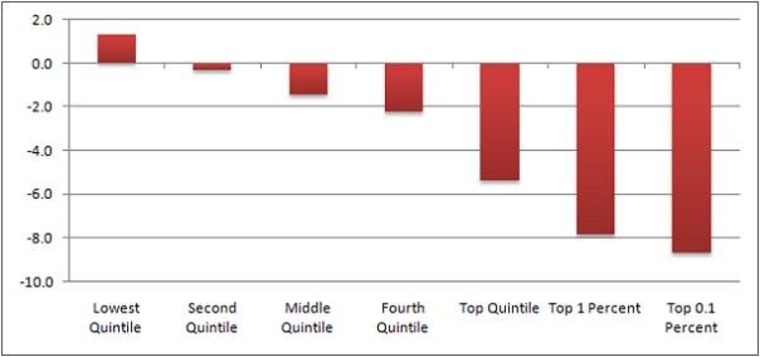The non-partisan Tax Policy Center published a fairly detailed analysis yesterday of Mitt Romney's new tax plan, and it led to a series of headlines like this one: "Wealthy would cash in under Romney tax plan."
Mitt Romney's new tax plan would mean lower taxes for most Americans. But some would benefit more than others.According to a new analysis from the Tax Policy Center, wealthy Americans would see their taxes fall precipitously under Mitt Romney's new plan -- which scraps the Alternative Minimum Tax and cuts marginal tax rates by 20%.Assuming the Bush tax cuts are extended, the Romney plan would give the top 1% of earners an average tax cut of $150,000, a 7.8% reduction in their average federal tax rate, according to the Tax Policy Center.
I put together a chart to help clarify the extent to which Romney's plan benefits the very wealthy more than everyone else. Using the Tax Policy Center analysis, here's the change in effective federal tax rates under the Romney plan.
Note, the Romney campaign insists that the former governor's plan would give everyone a tax break. Putting aside, at least for now, whether everyone really needs yet another tax break in a time of high deficits and considerable public needs, the talking point isn't quite right.
As the TPC analysis shows, those in the lowest quintile -- folks in the bottom 20% of all earners -- would actually see a tax increase under Romney's plan, because the Republican intends to eliminate several Obama-era policies that benefit those struggling most.
Romney would then extend modest breaks to the middle class, while slashing rates on the very wealthy. The top 1% of all earners would get a tax cut worth about $149,997 a year, while those at the bottom would get a tax hike of about $149 a year.
The Tax Policy Center, not surprisingly, also found that Romney's plan would make the deficit much worse -- nearly a half-trillion dollars in 2015 alone -- because the Republican has made no effort to explain how he'd pay for these unnecessary tax breaks.
And in an electoral context, all of this matters, not only because Romney is a fiscal fraud, but because it reinforces one of his central problems: he's a very rich conservative who intends to fight for other rich conservatives.
To help address Romney's difficulties with the working class, some on the right have encouraged the former governor to direct "some of his economic attention to the specific needs of struggling Americans." That's not bad advice, but Romney's tax plan makes clear, in a rather conspicuous way, how the Republican presidential hopeful is going out of his way to go in the opposite direction.
E.J. Dionne Jr. had a terrific column this week, driving the point home: Romney is pushing an "extremist economic agenda, built on "reactionary and regressive ideas."
Romney's plan is simultaneously extreme and very, very boring. It draws on the one and only idea that today's conservatives offer for solving any and every problem that comes along: just throw yet more money at rich people. [...]Romney promised to enact an "across-the-board, 20 percent rate cut for every American," pledged to "repeal the alternative minimum tax" and said he'd abolish the "death tax" (conservative-speak for the estate tax paid by only the most affluent Americans.) He'd lower the corporate tax rate to 25 percent, "make the R&D tax credit permanent to foster innovation" and "end the repatriation tax to return investment back to our shores."It's not exactly "Ask not what your country can do for you," but these ideas do appeal to Romney's most faithful constituency in primaries: Republicans earning more than $200,000 a year. In Michigan, they backed him over Santorum by 2 to 1.
Dionne concluded that for all of Santorum's extremism, it's Romney who has "radical views about how wealth and power ought to be distributed in the United States."
For all the talk from the right the last several years about "redistribution of wealth," the likely Republican presidential nominee has put forward an ambitious plan to do exactly that: redistribute wealth, rewarding those at the very top.
